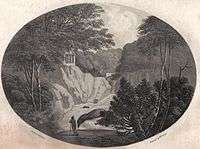Ossian's Hall of Mirrors
Ossian's Hall of Mirrors is a Georgian structure located at The Hermitage in Dunkeld, Scotland.
History of the site
The original view-house
The Hermitage and Ossian's Hall of Mirrors was originally an unremarkable view-house in a position overlooking the Black Linn falls of the Braan, a tributary of the River Tay. This folly was built on a rocky outcrop for the 2nd Duke of Atholl in 1757.[2]
Ossian's shrine
The Hermitage was redecorated in 1783 as a shrine to the blind bard, Ossian.[3] Ossian is supposed to have lived and written his heroic verse around the 3rd century.
The redecorated hall was intended to evoke features of 'shock' and 'amazement' in the viewers' minds; the room from where views of the waterfall were taken was lined with mirrors which made the spectator imagine that the water was appearing from all angles. William Wordsworth composed a poem which described the 'World of Wonder' in this room. Another description states that in the 1780s, visitors entering were met by a painting of Ossian serenading a group of maidens. The guide operated a device that withdrew the painting into the wall, providing access to another room - a hall of mirrors - giving the illusion of water pouring all around reflecting the river cascading outside.[4] In 1803 the hall had walks that were intersected, here and there, by a small garden of fine flowers among rocks and stones'. These small-scale gardens have since gone.
In 1803 Dorothy Wordsworth wrote "The waterfall, which we came to see, warned us by a loud roaring that we might expect it; we first, however, conducted into a small compartment, where the gardener desired us to look at a painting of the figure of Ossian, which, while he was telling us the story of the young artist who performed the work, disappeared, parting in the middle, flying asunder as if by the touch of magic, and lo! we are at the entrance of a splendid room, which was almost dizzy and alive with waterfalls, that tumbled in all directions - the great cascade, which was opposite to the window that faced us, being reflected in innumerable mirrors upon the ceiling and against the walls".[5]
Early literary accounts of the Hall of Mirrors
Garnett in 1800 visited the site. He describes the 'Hall of Mirrors' as having its sides and ceiling covered with mirrors, in which "the cascade is seen by reflection, sometimes running upwards, contrary to the direction of gravity, and sometimes in a horizontal stream over the head."[6]
The decline and restoration of the site
In 1869 vandals blew up part of Ossian's Hall and the area was left to decay. In 1943 the 8th Duchess of Atholl donated it and 33 acres (13.3ha) of, by then, coniferous woodland along the banks of the River Braan to the National Trust for Scotland in accordance with the wishes of the late Duke. The National Trust for Scotland restored the building in 2007 for the use and enjoyment of the public.[7]
Similar structures
- Bonnington Pavilion
References
- Garnett, T. Observations on a Tour through the Highlands and part of the Western Isles of Scotland, particularly Staff and Icolmkill. Pub. T. Cadell. The Strand.
- Trust Walks: "Dunkeld and The Hermitage," a podcast by the National Trust for Scotland; 27 June 2009
- The Hall of Mirrors at Hermitage, Dunkeld
- Scotland on Sunday article.
- Wordsworth, Dorothy (1894). Recollections of a Tour Made in Scotland AD 1803. Edinburgh : David Douglas. page 210
- Garnett, T. (1811). Observations on a Tour through the Highlands and part of the Western Isles of Scotland; particularly Staffa and Icolmkill. 2 (new ed.). London: John Stockdale. pp. 69–70.
- National trust for Scotland's Hemritage.
